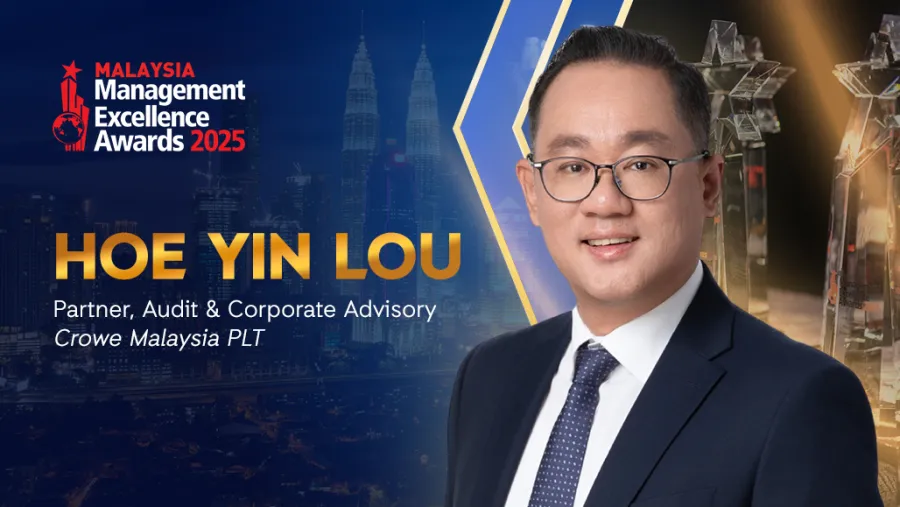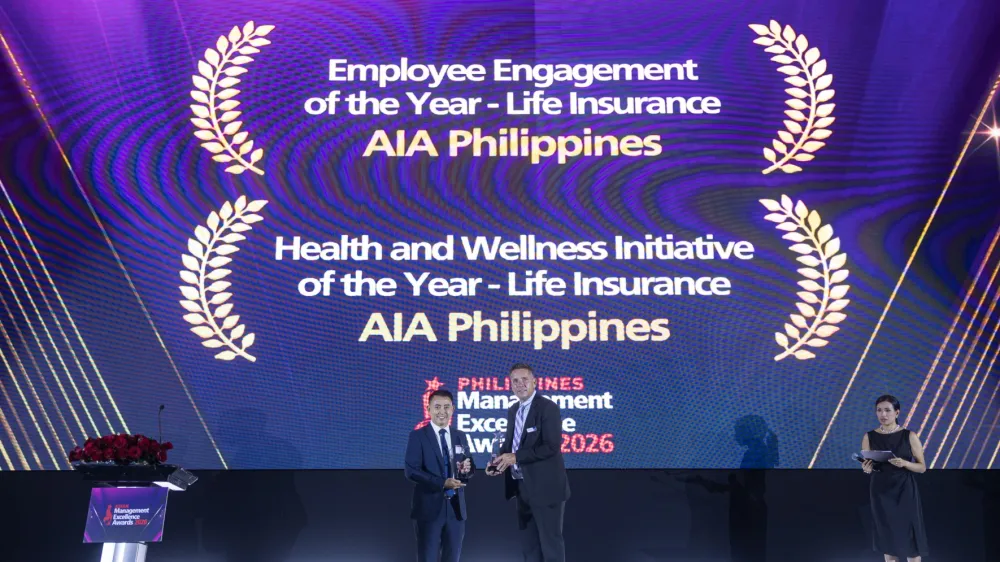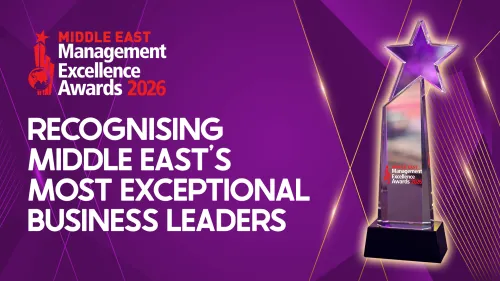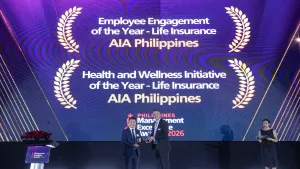
Strong management builds the foundation for governance and risk oversight – Crowe Malaysia’s Lou Hoe Yin
He emphasised that the future belongs to leaders who not only demonstrate strong competence but also uphold a deep sense of moral conscience.
Malaysia’s business landscape is evolving significantly, shaped by digital innovation, growing sustainability efforts, and shifting global dynamics. As the country strengthens its role as a regional hub for technology, advanced manufacturing, sustainable development, strong governance, and effective leadership are essential to drive continued growth.
Offering expert insights is Lou Hoe Yin, Partner, Audit & Corporate Advisory at Crowe Malaysia, with more than 20 years of professional experience. He is a familiar and respected presence on our panel of judges. He has extensive experience in providing audit and advisory services to a wide range of clients, including listed entities on Bursa Malaysia, multinational corporations, and privately owned companies.
Throughout his career, Hoe Yin has led various specialised and transaction-related assignments, including the preparation of accountants’ reports for corporate restructuring, fundraising, and IPO exercises. He has also played a key role in transaction advisory services, overseeing financial due diligence, post-closing reviews, and acquisition support for both local and cross-border transactions.
As a judge at the Malaysia Management Excellence Awards 2025, Hoe Yin delved into the corporate transformation, audit excellence, ESG integration, and the values shaping resilient leadership in Malaysia.
With your extensive experience, how would you describe the current state of corporate growth and transformation in Malaysia?
The corporate growth story in Malaysia is no longer linear; it's a story of strategic acceleration. Driven by a powerful combination of national policy and private-sector pragmatism, companies are rapidly digitalising and climbing the value chain. The result? A business environment defined by remarkable resilience and innovation, even amidst global headwinds.
Malaysia's economic trajectory remains strong, fuelled by consistent growth and a significant surge in investor confidence. Official data for 2024 reveals the country secured RM329.5 billion in approved investments, a testament to its competitive appeal. A key driver of this success was a remarkable 126.5% increase in Foreign Direct Investment (FDI), with major projects flowing into high-growth sectors like electronics and semiconductors, digital infrastructure, and renewable energy. These investments are expected to generate more than 115,000 jobs, solidifying Malaysia's position as a key hub for advanced technology and manufacturing in the region.
The digital transformation has moved from adoption to acceleration. National imperatives, such as the MyDIGITAL initiative and the National 4IR Policy, are catalysing the widespread integration of generative AI, industrial automation, and cloud-native solutions. This is supported by the country's emergence as a strategic data centre and cloud hub for Southeast Asia, attracting massive investments from companies like Google, Microsoft, and AWS. This robust digital infrastructure, coupled with a growing tech talent pool, is enabling Malaysian businesses to innovate and compete globally.
Furthermore, sustainability is now a central focus of corporate strategy and risk management in Malaysia. Anchored by the government's National Energy Transition Roadmap (NETR) and Hydrogen Economy ambitions, the transition to a low-carbon economy is accelerating. Businesses are responding not just to policy but to tangible financial incentives and stakeholder demands. This is manifesting in the explosive growth of sustainability-linked loans, strategic investments in solar and bioenergy, and the integration of circular principles into supply chains. Today, robust ESG performance is less about compliance and more about securing investment, accessing new markets, and future-proofing the business.
The Malaysian government is structuring a comprehensive reform agenda to future-proof the economy. Budget 2026 is expected to double down on fiscal responsibility and targeted spending, whilst the 13th Malaysia Plan (2026-2030) will provide the master blueprint, intricately linking national goals for energy transition, digitalisation, and regional economic development. This synergistic approach—prioritising subsidy rationalisation, e-invoicing implementation, and high-value job creation—is designed to de-risk the market and firmly position Malaysia as a stable, competitive, and forward-looking investment destination.
Malaysia's business landscape rewards the resilient, the digital, and the sustainable. Companies mastering this formula aren't just surviving the shift—they're leading it.
How do you see the role of audit and assurance evolving in promoting corporate governance and transparency within Malaysian businesses?
The rapid transformation of Malaysia's corporate landscape is fundamentally elevating the mandate of audit and assurance. Beyond financial verification, the profession is now a vital enabler of transparency and trust, providing the independent validation necessary to navigate risk, secure investment, and underpin sustainable growth.
Think of an audit not as a compliance exercise, but as the independent verification that turns data into trust. It is the rigorous process that certifies a company's financial statements are a true and fair reflection of its health. For every investor, regulator, and board member, this isn't just about accuracy—it's about the confidence to make multi-million dollar decisions, secure in the knowledge that the foundation they're building on is solid.
In today's market, trust is a company's most valuable asset. Regular, independent audits are the disciplined process that builds and protects this asset. By rigorously validating financials, assessing risks, and providing objective insights, auditors fortify the organisation's integrity. This creates a foundation of transparency that attracts investment, secures partnerships, and reinforces the ethical standards that define a modern, resilient enterprise.
The Malaysian audit profession is undergoing a profound transformation, mirroring the nation's own leap into a digital, ESG-driven economy. We are moving from a retrospective compliance function to a forward-looking, strategic partner. Leveraging AI for deep data analysis and blockchain for immutable verification, the audit of the future is becoming deeply data-driven. This shift, supported by innovative regulatory sandboxes, enables a more proactive, predictive form of assurance—one that doesn't just report on risk but helps management pre-empt it.
In essence, the mandate of audit and assurance has fundamentally expanded. It is no longer a retrospective verification of ledgers but a proactive engine for trust and strategic resilience. For Malaysian businesses charting a course through global complexity, a robust audit function is indispensable—it is the discipline that validates integrity, ensures accountability, and ultimately, enables the sustainable growth that earns lasting stakeholder confidence.
With increasing emphasis on ESG reporting and sustainability assurance, how can Malaysian companies strike the right balance between compliance and genuine value creation?
ESG has moved to the core of corporate strategy in Malaysia. But here is the critical dilemma: will your organisation treat it as a costly compliance exercise or as the single greatest lever for building long-term value? The gap between leaders and laggards will be defined by who successfully transforms ESG data from a report into a roadmap—a roadmap for risk mitigation, talent attraction, and sustainable profitability.
The key is integration. We see leading Malaysian companies across sectors embedding ESG directly into their value proposition. Hartalega has turned energy efficiency into a competitive advantage in manufacturing, whilst property giant S P Setia commands a market premium for its sustainable townships. In finance, Maybank and CIMB are not just managing risk but actively driving the transition by tying loan conditions to sustainability performance, proving that ESG is a powerful lever for innovation and new revenue.
The market is now unequivocally rewarding ESG leadership. Companies with robust sustainability practices are attracting a premium from investors, commanding higher valuations, and securing preferential access to green financing. This isn't just theoretical; the FTSE4Good Bursa Malaysia Index has consistently outperformed the broader market, demonstrating a clear correlation between strong ESG credentials and superior financial returns and profitability.
Malaysia is now establishing robust sustainability assurance frameworks to move ESG from marketing to measurable truth. This shift is crucial for weeding out greenwashing and, more importantly, for building a foundation of credible, comparable data. As independent verification becomes the norm, it will transform ESG disclosures from unverified statements into decision-useful intelligence, giving investors and stakeholders the confidence to allocate capital to truly sustainable enterprises.
The ESG wave is now reaching the heart of the Malaysian economy: its SMEs. No longer left behind, they are rapidly catching up, empowered by practical toolkits, financial incentives, and simplified frameworks designed for their scale. For those who have moved early, the payoff is clear—it's translating directly into new revenue streams and unlocked opportunities with larger, sustainability-focused corporations.
Millennials & Gen Z now choose employers based on shared values. For the next generation of talent, a company's values are a deciding factor. Authentic ESG commitment could be a key advantage, making the company a magnet for top performers, boosting retention, and building a resilient, purpose-driven culture from the inside out.
So, what is the ultimate takeaway? ESG should not be seen as a burden but as a catalyst for a brighter, more profitable future. Compliance is a starting point, but the destination is value creation—driven by innovation, built on transparency, and powered by purpose. Malaysian businesses should lead the way, proving that the alignment of profit, planet, and people is not just possible—it is essential for success.
What role do you believe strong management and ethical leadership play in driving long-term corporate resilience?
In an era defined by rapid change and rising stakeholder expectations, we often look to strategy and technology for resilience. But the true, unshakeable foundation of long-term corporate resilience lies elsewhere. It lies in leadership. It is strong, decisive management and unwavering ethical leadership that serve as our anchors. They are what allow us to not just weather uncertainty but to truly thrive—sustainably and with purpose.
I believe that ethical leadership, demonstrated through integrity, transparency, and fairness, is the cornerstone of sustainable trust. This trust, built internally with our teams and externally with our stakeholders, creates invaluable reputational capital. This capital is critical for navigating challenges, attracting and retaining key partners and talent, and ensuring the long-term health of the organisation.
Let's look at resilience through a strategic lens. The most resilient organisations are fundamentally purpose-driven. Why? When ethical leaders instil a value-based culture, it creates operational consistency. Teams are aligned because everyone is working from the same principled playbook. Morale improves because work has meaning. And this foundation empowers your people on the front lines to make smart, responsible decisions autonomously, especially in high-pressure situations. This isn't just good ethics—it's a significant risk mitigation and performance strategy.
Strong management builds the necessary structures for governance and risk oversight. Ethical leadership, however, provides the crucial proactive element. It's the difference between having a fire alarm and a team of inspectors who constantly work to prevent fires. This anticipatory approach is what truly safeguards a business from financial, operational, and reputational threats before they can escalate.
Resilience isn’t just about surviving—it’s about adapting. Ethical leaders prioritise long-term value over short-term gains, ensuring the business remains relevant and responsible in a changing world.
We must recognise that strong management and ethical leadership are far more than just 'soft skills'—they are fundamental strategic imperatives. They are the twin engines that shape resilient organisations: capable of withstanding economic shocks, adept at adapting to market changes, and committed to leading with a clear purpose. For Malaysia, and for the global stage, the future will unequivocally belong to those companies led by individuals who successfully combine unwavering competence with a strong moral conscience.
Looking ahead, what trends or shifts do you foresee shaping the business and management environment in Malaysia in the coming years?
As Malaysia steps into a new era of growth and transformation, the business and management landscape is evolving rapidly. I personally believe that the key trends shaping the future of corporate strategy, leadership, and innovation in the country will centre around digital transformation, sustainability, and human capital development.
Digital transformation is no longer just about adoption—it’s about integration. Malaysian companies are moving from basic digital tools to advanced AI, data analytics, and platform-based ecosystems. Technology will drive not only efficiency but also ESG performance, with AI, blockchain, and IoT enabling smarter, greener operations.
At the same time, ESG is becoming a strategic imperative. Mandatory ESG reporting is on the horizon, and the green economy is emerging as a major growth sector. Companies that embed sustainability into their DNA will attract top talent and unlock new markets in green finance, renewables, and circular solutions.
Meanwhile, global supply chains are shifting, and Malaysia is well-positioned to benefit. As firms diversify away from geopolitical hotspots, Malaysia’s neutrality and competitiveness make it a prime hub for manufacturing and logistics. Regional trade agreements like RCEP will further strengthen ASEAN-centric supply chains.
Moreover, the future of work is becoming hybrid, flexible, and skills-based. Leadership models will shift from command-and-control to coaching and empowerment. As automation takes over routine tasks, human-centric skills—such as empathy, creativity, and critical thinking—will become the most valuable assets in any organisation.
Gen Z and Millennials are also reshaping both the workforce and marketplace. They demand authenticity, digital-native experiences, and purpose-driven brands. Meanwhile, the gig economy is formalising, prompting new regulations and innovative business models to support freelance talent.
As innovation continues to outpace regulation, Malaysia is responding with adaptive frameworks and sandbox environments. Cybersecurity will increasingly become a board-level priority, essential for protecting data, operations, and customer trust in an increasingly digital world.
In summary, the Malaysian business leader of tomorrow must be tech-savvy, agile, ESG-fluent, and deeply human-centric. The future belongs to those who view these trends not as isolated challenges but as interconnected opportunities in a dynamic, competitive landscape.
As a judge for the Malaysia Management Excellence Awards 2025, what key criteria will you be looking for when assessing nominees’ achievements and organisational impact?
As a judge for the Malaysia Management Excellence Awards 2025, my mandate is clear: to identify and celebrate those exceptional organisations and leaders who exemplify the very highest standards of excellence. Our evaluation looks beyond mere financial performance to honour those who demonstrate a powerful sense of purpose, a commitment to groundbreaking innovation, and a tangible, positive impact. We are searching for more than just impressive numbers; we are seeking evidence of meaningful transformation and a clear blueprint for sustainable success.
My first criterion focuses on strategic clarity and executional excellence. I will be evaluating how seamlessly the nominee's strategy aligns with their stated long-term vision. Crucially, I will then assess the rigour and effectiveness with which that strategy was executed. The key question is: did their strategic initiatives deliver tangible, measurable improvements in performance, market positioning, or stakeholder value? The strongest entries will present a compelling narrative that demonstrates both ambitious vision and disciplined, results-oriented execution.
Innovation serves as a key differentiator in today's competitive landscape. My evaluation will focus on how nominees have proactively embraced change—be it through comprehensive digital transformation, the development of new business models, or a culture of creative problem-solving. The central question will be: how has this innovative drive tangibly contributed to the organisation's growth, enhanced its operational excellence, or fortified its long-term resilience?
Leadership is the cornerstone of organisational excellence. My evaluation will seek concrete evidence of ethical, inclusive, and visionary leadership. I will be looking for leaders who not only articulate a compelling vision but also actively inspire their teams and consciously shape a high-performing, positive culture. Specifically, I will examine how they have empowered their people, navigated significant challenges with integrity, and deliberately fostered a culture of agility and collaboration to drive the organisation forward.
With ESG now central to robust business strategy, my evaluation will focus on the depth and authenticity of how nominees integrate environmental, social, and governance principles into their core operations. The key question is whether they are driving sustainability initiatives merely for compliance or if they are leveraging ESG as a strategic engine for long-term value creation and positive, measurable societal impact.
The bedrock of any enduring organisation is built on transparency, accountability, and the stakeholder trust they foster. My evaluation will, therefore, scrutinise how nominees actively and meaningfully engage with all their key stakeholders—be it customers, employees, investors, or the communities they operate in. I will be looking for strong, demonstrable governance practices and unwavering ethical conduct as the key indicators of an organisation built for long-term credibility and sustainable success.
Finally, my evaluation will rest on two pillars: tangible results and enduring legacy. I will examine the clear evidence of success—be it in growth metrics, operational improvements, talent development, or community impact. But beyond these immediate outcomes, I will also consider the nominee's broader contribution: How have they helped to shape a more resilient, innovative, and responsible business landscape in Malaysia? This legacy is the true mark of excellence.
Ultimately, the Malaysia Management Excellence Awards is about more than achievement; they are about recognising a distinct calibre of leadership. We celebrate those who lead with unwavering integrity, who innovate with a clear and purposeful vision, and who deliver a tangible impact that endures. I am truly excited to help celebrate the organisations and individuals who prove that it is not enough to be successful—the true benchmark is to be significant.


















 Advertise
Advertise









